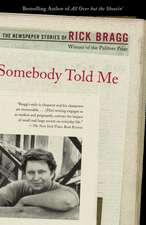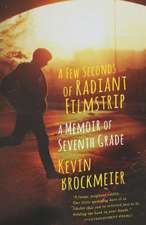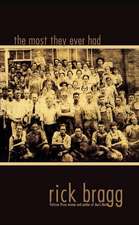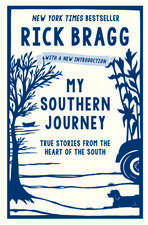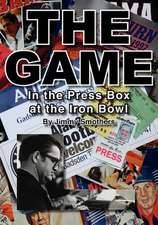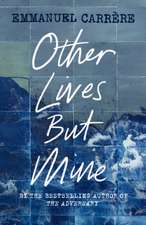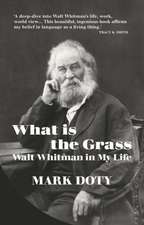Ava's Man
Autor Rick Braggen Limba Engleză Paperback – 31 iul 2002 – vârsta de la 14 până la 18 ani
In telling Charlie’s story, Bragg conjures up the backwoods hamlets of Georgia and Alabama in the years when the roads were still dirt and real men never cussed in front of ladies. A masterly family chronicle and a human portrait so vivid you can smell the cornbread and whiskey, Ava’s Man is unforgettable.
Preț: 89.91 lei
Nou
Puncte Express: 135
Preț estimativ în valută:
17.20€ • 18.01$ • 14.24£
17.20€ • 18.01$ • 14.24£
Carte disponibilă
Livrare economică 15-29 martie
Preluare comenzi: 021 569.72.76
Specificații
ISBN-13: 9780375724442
ISBN-10: 0375724443
Pagini: 272
Ilustrații: 1 HALFTONE
Dimensiuni: 130 x 201 x 15 mm
Greutate: 0.2 kg
Editura: Vintage Publishing
ISBN-10: 0375724443
Pagini: 272
Ilustrații: 1 HALFTONE
Dimensiuni: 130 x 201 x 15 mm
Greutate: 0.2 kg
Editura: Vintage Publishing
Recenzii
“Grab[s] you from the first sentence....[and] stays with you long after you put it down....It is hard to think of a writer who reminds us more forcefully and wonderfully of what people and families are all about.” —The New York Times Book Review
“Earthy, mischievous, yet gorgeous. . . . [Bragg’s] tales . . . would not be out of place if they were told around a campfire.” —San Francisco Chronicle
“As toothsome as a catfish supper. [Bragg] is every bit the equal of . . . Harper Lee and Truman Capote.” —People
“[Bragg has] a true gift for great storytelling (the kind...that makes you think it’s just a plain old story, until he gets to the end and you’re either weeping or covered with goosebumps).” —New Orleans Times-Picayune
“Earthy, mischievous, yet gorgeous. . . . [Bragg’s] tales . . . would not be out of place if they were told around a campfire.” —San Francisco Chronicle
“As toothsome as a catfish supper. [Bragg] is every bit the equal of . . . Harper Lee and Truman Capote.” —People
“[Bragg has] a true gift for great storytelling (the kind...that makes you think it’s just a plain old story, until he gets to the end and you’re either weeping or covered with goosebumps).” —New Orleans Times-Picayune
Notă biografică
Rick Bragg is the best-selling author of All Over but the Shoutin’ and Somebody Told Me. A national correspondent for the The New York Times, he was awarded the Pulitzer Prize for feature writing in 1996. He lives in New Orleans.
Extras
From Chapter One:
The beatin’ of Blackie Lee
The foothills of the Appalachians
the 1930s
Ava met him at a box-lunch auction outside Gadsden, Alabama, when she was barely fifteen, when a skinny boy in freshly washed overalls stepped from the crowd of bidders, pointed to her and said, “I got one dollar, by God.” In the evening they danced in the grass to a fiddler and banjo picker, and Ava told all the other girls she was going to marry that boy someday, and she did. But to remind him that he was still hers, after the cotton rows aged her and the babies came, she had to whip a painted woman named Blackie Lee.
Maybe it isn’t quite right to say that she whipped her. To whip somebody, down here, means there was an altercation between two people, and somebody, the one still standing, won. This wasn’t that. This was a beatin’, and it is not a moment that glimmers in family history. But of all the stories I was told of their lives together, this one proves how Ava loved him, and hated him, and which emotion won out in the end.
Charlie Bundrum was what women here used to call a purty man, a man with thick, sandy hair and blue eyes that looked like something you would see on a rich woman’s bracelet. His face was as thin and spare as the rest of him, and he had a high-toned, chin-in-the-air presence like he had money, but he never did. His head had never quite caught up with his ears, which were still too big for most human beings, but the women of his time were not particular as to ears, I suppose.
He was also a man who was not averse to stopping off at the beer joint, now and again, and that was where he encountered a traveling woman with crimson lipstick and silk stockings named Blackie Lee. People called her Blackie because of her coal-black hair, and when she told my granddaddy that she surely was parched and tired and sure would ’preciate a place to wash her clothes and rest a spell before she moved on down the road, he told her she was welcome at his house.
They were living in north Georgia at that time, outside Rome. Ava and the five children—there was only James, William, Edna, Juanita and Margaret then—were a few miles away, working in Newt Morrison’s cotton field. Charlie always took in strays—dogs, men and women, who needed a place—but Blackie was a city woman and pretty, too, which set the stage for mayhem.
It all might have gone unnoticed. Blackie Lee might’ve washed her clothes, set a spell and then just moved along, if that was all that she was after. But we’ll never know. We’ll never know because she had the misfortune to hang her stockings on Ava Bundrum’s clothesline in front of God and everybody.
Miles away from there, Ava was hunched over in the cotton field, dragging a heavy sack, her fingers and thumbs on fire from the needle-sharp stickers on the cotton bolls. Newt Morrison’s daughter, Sis, came up alongside of her in the field, one row over, and lit the fuse.
“Ava,” said Sis, who had driven past Ava and Charlie’s house earlier that day, “did you get you some silk stockings?”
Ava said no she had not, what foolishness, and just picked on.
“Well,” Sis said, “is your sister Grace visitin’ you?”
No, Ava said, if Grace had come to visit, she would have written or sent word.
“Well,” said Sis, “I drove past y’all’s place and seen some silk stockings on the line, and I thought they must have been Grace’s, ’cause she’s the only one I could think of that would have silk stockings.”
Ava said well, maybe it was Grace, and picked on. Grace had wed a rich man and had silk stockings and a good car and may have come by, just on a whim. That must be it. Had to be.
Edna, then only a little girl, said her momma just kept her back bowed and her face down for a few more rows, then jerked bolt upright as if she had been stung by a bee, snatched the cotton sack from her neck and flung it, heavy as it was, across two rows.
Then she just started walking, and the children, puzzled, hurried after her. Even as an old woman Ava could walk most people plumb into the ground, and as a young woman she just lowered her head and swung her arms and kicked up dust as she powered down the dirt road to home.
When she swung into the yard, sometime later, it was almost dark and Blackie Lee was on the porch, cooling herself. Ava stopped and drew a breath and just looked at her for a moment, measuring her for her coffin. Then she stomped over to the woodpile and picked up the ax.
About that time it must have dawned on Blackie Lee who this young woman was, who these big-eyed children were, and she ran inside, put the latch down on the door and began to speak to Jesus.
Ava just stood there, breathing hard, her long hair half in and half out of her dew rag, and announced that the woman could either open the door and take her beatin’ or take her beatin’ after Ava hacked down her own door. And “you might not want me to walk in thar, with a’ ax in my hand.” Blackie Lee, hysterical, unlatched the door and stepped back, and Ava, as she promised, dropped the ax and stepped inside.
She might not have beat the woman quite so bad if it had not been for the dishpan. It had dirty water in it, from that woman’s clothes. No one, no one, washed their clothes in Ava’s dishpan.
Edna stood at the door, peeking.
Listen to her:
“Momma beat her all through the house. She beat her out onto the porch, beat her out into the yard and beat her down to the road, beat her so hard that her hands swelled up so big she couldn’t fit ’em in her apron pocket. Then she grabbed aholt of her with one hand and used the other hand to flag down a car that was comin’, and she jerked open that car door and flung that woman in and told the man drivin’ that car to get her ‘on outta here.’ And that man said, ‘Yes, ma’am,’ and drove off with Blackie Lee.”
Charlie was at work when this happened, which was very fortunate, so fortunate that, even now, his children swear that there was God’s hand in it. Even with temptation at his house, he went off to work, and made a living, and it saved him, it saved everything. A weak man would have just laid out that day, and if he had been home Ava would have killed him dead as Julius Caesar.
Ava and the five children went back to Newt Morrison’s to spend the night. Newt was distant kin and Ava knew she was welcome there. But first she walked inside her house and threw that dishpan out into the yard as far as she could.
That night, Charlie showed up to take them home. And Ava lit into him so hard and so fast that Charlie lost one of his shoes in the melee and had to fight from an uneven platform, which is bad when you have what seems to be a badger crawling and spittin’ around your head. They fought, Edna said, all the way down the hall, crashing hard into the wall, making a hellish racket and scaring everybody in there to death. Children screamed and dogs barked and Charlie just kept on hollerin’ over and over, “Dammit, Ava. Quit.” Finally they crashed onto a bed, and into the room walked the old man, Newt, barefoot, one of his overall galluses on and one off. Newt thought that it was Charlie who was beating his wife to death, instead of the other way around, and all he knew was that this boy, Charlie, kin or not, had invaded his home, rattled the walls and frightened his family.
Newt, stooped and gray and gnarly, was much too old to fistfight a man in his own house. So he reached into his overalls pocket, fished out his pocketknife and flicked out a blade long enough to cut watermelon.
Ava took one look at that knife and flung her body across her husband, to shield him. Then she looked up at Newt, and when she spoke there were spiders and broken glass in her voice.
“Don’t you touch him,” she hissed.
* * *
Everybody has a moment like it. If they never did, they never did love nobody, truly. People who have lived a long, long time say it, so it must be so.
* * *
They never spoke about it. They never had another moment like it again. They fought—my Lord, did they fight—for thirty years, until the children were mostly grown and gone. But they stuck. You go through as much as they did, you stick. I have seen old people do it out of spite, as if growing old together was some sweet revenge. Charlie and Ava did not get to grow old together. What they got was life condensed, something richer and sweeter and—yes—more bitter and violent, life with the dull moments just boiled or scorched away.
She never bowed to him, and he never made her, and they lived that way, in the time they had.
Every now and then, they would jab a little. She would stand over her new dishpan and recite a little poem as she gently rinsed her iron skillet and biscuit pans:
Single life is a happy life
Single life is a pleasure
I am single and no man’s wife
And no man can control me
He would pretend not to hear. And bide his time, to get even.
“Daddy,” Margaret asked him once, when she was still a little girl, “how come you haven’t bought us a radio?”
Charlie would just shake his head.
“Hon, we don’t need no radio,” he would say, and then he would point one of his long, bony fingers at Ava. “I already got a walkie-talkie.”
And on and on it went, them pretending, maybe out of pride, that they did not love each other, and need each other, as much as they did.
As time dragged on they would break out the banjo—Charlie was hell-hot on a banjo—and the guitar, which Ava played a lifetime. And in the light of an old kerosene lantern, as the children looked on from their beds, they would duel.
Charlie would do “Doin’ My Time”—his commentary on marriage—and grin while she stared hard at him from behind her spectacles:
On this ol’ rock pile
With a ball and chain
They call me by a number
Not my name
Gotta do my time
Lord, Lord
Gotta do my time
Then Ava would answer with “Wildwood Flower” or something like it:
I’ll sing and I’ll dance
And my laugh shall be gay
I’ll charm every heart
And the crowd I will sway
I’ll live yet to see him
Regret the dark hour
When he won and neglected
This frail wildwood flower
And Charlie would sing back at her with another song, about being on a chain gang, or doing time in a Yankee prison, or “All the Good Times Are Past and Gone”:
I wish to the Lord
I’d never been born
Or “Knoxville Girl”:
We went to take an evening walk
About a mile from town
I picked a stick up off the ground
And knocked that fair girl down
But it always ended in dancing, somehow. He would beat those banjo strings and she would buck-dance around the kitchen, her skirts in her hands, her heavy shoes smacking into the boards, and the children would laugh, because it is impossible not to when your momma acts so young.
* * *
Much, much later, when she had passed seventy, she still played and she still sang but she could not really see how to tune her guitar, and her hand shook too much to do it right, anyway. She would miss a lick now and then, and she would always frown at what time had done to her. But she never forgot the words to “Wildwood Flower.”
I’ll think of him never
I’ll be wild and gay
I’ll cease this wild weeping,
Drive sorrow away
But I wake from my dreaming
My idol was clay
My visions of love
Have all vanished away
* * *
It didn’t all start there, of course, with the beating of that unfortunate woman. The beginning of their story goes way, way back, beyond them, even beyond the first Bundrum to drift here, to these green foothills that straddle the Alabama-Georgia border. In it, I found not only the beginnings of a family history but a clue to our character.
All my life, I have heard the people of the foothills described as poor, humble people, and I knew that was dead wrong. My people were, surely, poor, but they were seldom humble. Charlie sure wasn’t, and his daddy wasn’t, and I suspect that his daddy’s daddy wasn’t humble a bit. And Ava, who married into that family, was no wilting flower, either. A little humility, a little meekness of spirit, might have spared us some pain, over the years, but the sad truth is, it’s just not in us. With the exception of my own mother, maybe, it never was.
For a family so often poor, we have, for a hundred years or more, refused to adapt our character very much. But then, if we had been willing to change just a little bit, we never would have gotten here in the first place.
We are here because our ancestors were too damn hardheaded to adapt, to assimilate. We are here because someone with a name very much like Bundrum picked a fight with the King of France, and the Church of Rome.
From the Hardcover edition.
The beatin’ of Blackie Lee
The foothills of the Appalachians
the 1930s
Ava met him at a box-lunch auction outside Gadsden, Alabama, when she was barely fifteen, when a skinny boy in freshly washed overalls stepped from the crowd of bidders, pointed to her and said, “I got one dollar, by God.” In the evening they danced in the grass to a fiddler and banjo picker, and Ava told all the other girls she was going to marry that boy someday, and she did. But to remind him that he was still hers, after the cotton rows aged her and the babies came, she had to whip a painted woman named Blackie Lee.
Maybe it isn’t quite right to say that she whipped her. To whip somebody, down here, means there was an altercation between two people, and somebody, the one still standing, won. This wasn’t that. This was a beatin’, and it is not a moment that glimmers in family history. But of all the stories I was told of their lives together, this one proves how Ava loved him, and hated him, and which emotion won out in the end.
Charlie Bundrum was what women here used to call a purty man, a man with thick, sandy hair and blue eyes that looked like something you would see on a rich woman’s bracelet. His face was as thin and spare as the rest of him, and he had a high-toned, chin-in-the-air presence like he had money, but he never did. His head had never quite caught up with his ears, which were still too big for most human beings, but the women of his time were not particular as to ears, I suppose.
He was also a man who was not averse to stopping off at the beer joint, now and again, and that was where he encountered a traveling woman with crimson lipstick and silk stockings named Blackie Lee. People called her Blackie because of her coal-black hair, and when she told my granddaddy that she surely was parched and tired and sure would ’preciate a place to wash her clothes and rest a spell before she moved on down the road, he told her she was welcome at his house.
They were living in north Georgia at that time, outside Rome. Ava and the five children—there was only James, William, Edna, Juanita and Margaret then—were a few miles away, working in Newt Morrison’s cotton field. Charlie always took in strays—dogs, men and women, who needed a place—but Blackie was a city woman and pretty, too, which set the stage for mayhem.
It all might have gone unnoticed. Blackie Lee might’ve washed her clothes, set a spell and then just moved along, if that was all that she was after. But we’ll never know. We’ll never know because she had the misfortune to hang her stockings on Ava Bundrum’s clothesline in front of God and everybody.
Miles away from there, Ava was hunched over in the cotton field, dragging a heavy sack, her fingers and thumbs on fire from the needle-sharp stickers on the cotton bolls. Newt Morrison’s daughter, Sis, came up alongside of her in the field, one row over, and lit the fuse.
“Ava,” said Sis, who had driven past Ava and Charlie’s house earlier that day, “did you get you some silk stockings?”
Ava said no she had not, what foolishness, and just picked on.
“Well,” Sis said, “is your sister Grace visitin’ you?”
No, Ava said, if Grace had come to visit, she would have written or sent word.
“Well,” said Sis, “I drove past y’all’s place and seen some silk stockings on the line, and I thought they must have been Grace’s, ’cause she’s the only one I could think of that would have silk stockings.”
Ava said well, maybe it was Grace, and picked on. Grace had wed a rich man and had silk stockings and a good car and may have come by, just on a whim. That must be it. Had to be.
Edna, then only a little girl, said her momma just kept her back bowed and her face down for a few more rows, then jerked bolt upright as if she had been stung by a bee, snatched the cotton sack from her neck and flung it, heavy as it was, across two rows.
Then she just started walking, and the children, puzzled, hurried after her. Even as an old woman Ava could walk most people plumb into the ground, and as a young woman she just lowered her head and swung her arms and kicked up dust as she powered down the dirt road to home.
When she swung into the yard, sometime later, it was almost dark and Blackie Lee was on the porch, cooling herself. Ava stopped and drew a breath and just looked at her for a moment, measuring her for her coffin. Then she stomped over to the woodpile and picked up the ax.
About that time it must have dawned on Blackie Lee who this young woman was, who these big-eyed children were, and she ran inside, put the latch down on the door and began to speak to Jesus.
Ava just stood there, breathing hard, her long hair half in and half out of her dew rag, and announced that the woman could either open the door and take her beatin’ or take her beatin’ after Ava hacked down her own door. And “you might not want me to walk in thar, with a’ ax in my hand.” Blackie Lee, hysterical, unlatched the door and stepped back, and Ava, as she promised, dropped the ax and stepped inside.
She might not have beat the woman quite so bad if it had not been for the dishpan. It had dirty water in it, from that woman’s clothes. No one, no one, washed their clothes in Ava’s dishpan.
Edna stood at the door, peeking.
Listen to her:
“Momma beat her all through the house. She beat her out onto the porch, beat her out into the yard and beat her down to the road, beat her so hard that her hands swelled up so big she couldn’t fit ’em in her apron pocket. Then she grabbed aholt of her with one hand and used the other hand to flag down a car that was comin’, and she jerked open that car door and flung that woman in and told the man drivin’ that car to get her ‘on outta here.’ And that man said, ‘Yes, ma’am,’ and drove off with Blackie Lee.”
Charlie was at work when this happened, which was very fortunate, so fortunate that, even now, his children swear that there was God’s hand in it. Even with temptation at his house, he went off to work, and made a living, and it saved him, it saved everything. A weak man would have just laid out that day, and if he had been home Ava would have killed him dead as Julius Caesar.
Ava and the five children went back to Newt Morrison’s to spend the night. Newt was distant kin and Ava knew she was welcome there. But first she walked inside her house and threw that dishpan out into the yard as far as she could.
That night, Charlie showed up to take them home. And Ava lit into him so hard and so fast that Charlie lost one of his shoes in the melee and had to fight from an uneven platform, which is bad when you have what seems to be a badger crawling and spittin’ around your head. They fought, Edna said, all the way down the hall, crashing hard into the wall, making a hellish racket and scaring everybody in there to death. Children screamed and dogs barked and Charlie just kept on hollerin’ over and over, “Dammit, Ava. Quit.” Finally they crashed onto a bed, and into the room walked the old man, Newt, barefoot, one of his overall galluses on and one off. Newt thought that it was Charlie who was beating his wife to death, instead of the other way around, and all he knew was that this boy, Charlie, kin or not, had invaded his home, rattled the walls and frightened his family.
Newt, stooped and gray and gnarly, was much too old to fistfight a man in his own house. So he reached into his overalls pocket, fished out his pocketknife and flicked out a blade long enough to cut watermelon.
Ava took one look at that knife and flung her body across her husband, to shield him. Then she looked up at Newt, and when she spoke there were spiders and broken glass in her voice.
“Don’t you touch him,” she hissed.
* * *
Everybody has a moment like it. If they never did, they never did love nobody, truly. People who have lived a long, long time say it, so it must be so.
* * *
They never spoke about it. They never had another moment like it again. They fought—my Lord, did they fight—for thirty years, until the children were mostly grown and gone. But they stuck. You go through as much as they did, you stick. I have seen old people do it out of spite, as if growing old together was some sweet revenge. Charlie and Ava did not get to grow old together. What they got was life condensed, something richer and sweeter and—yes—more bitter and violent, life with the dull moments just boiled or scorched away.
She never bowed to him, and he never made her, and they lived that way, in the time they had.
Every now and then, they would jab a little. She would stand over her new dishpan and recite a little poem as she gently rinsed her iron skillet and biscuit pans:
Single life is a happy life
Single life is a pleasure
I am single and no man’s wife
And no man can control me
He would pretend not to hear. And bide his time, to get even.
“Daddy,” Margaret asked him once, when she was still a little girl, “how come you haven’t bought us a radio?”
Charlie would just shake his head.
“Hon, we don’t need no radio,” he would say, and then he would point one of his long, bony fingers at Ava. “I already got a walkie-talkie.”
And on and on it went, them pretending, maybe out of pride, that they did not love each other, and need each other, as much as they did.
As time dragged on they would break out the banjo—Charlie was hell-hot on a banjo—and the guitar, which Ava played a lifetime. And in the light of an old kerosene lantern, as the children looked on from their beds, they would duel.
Charlie would do “Doin’ My Time”—his commentary on marriage—and grin while she stared hard at him from behind her spectacles:
On this ol’ rock pile
With a ball and chain
They call me by a number
Not my name
Gotta do my time
Lord, Lord
Gotta do my time
Then Ava would answer with “Wildwood Flower” or something like it:
I’ll sing and I’ll dance
And my laugh shall be gay
I’ll charm every heart
And the crowd I will sway
I’ll live yet to see him
Regret the dark hour
When he won and neglected
This frail wildwood flower
And Charlie would sing back at her with another song, about being on a chain gang, or doing time in a Yankee prison, or “All the Good Times Are Past and Gone”:
I wish to the Lord
I’d never been born
Or “Knoxville Girl”:
We went to take an evening walk
About a mile from town
I picked a stick up off the ground
And knocked that fair girl down
But it always ended in dancing, somehow. He would beat those banjo strings and she would buck-dance around the kitchen, her skirts in her hands, her heavy shoes smacking into the boards, and the children would laugh, because it is impossible not to when your momma acts so young.
* * *
Much, much later, when she had passed seventy, she still played and she still sang but she could not really see how to tune her guitar, and her hand shook too much to do it right, anyway. She would miss a lick now and then, and she would always frown at what time had done to her. But she never forgot the words to “Wildwood Flower.”
I’ll think of him never
I’ll be wild and gay
I’ll cease this wild weeping,
Drive sorrow away
But I wake from my dreaming
My idol was clay
My visions of love
Have all vanished away
* * *
It didn’t all start there, of course, with the beating of that unfortunate woman. The beginning of their story goes way, way back, beyond them, even beyond the first Bundrum to drift here, to these green foothills that straddle the Alabama-Georgia border. In it, I found not only the beginnings of a family history but a clue to our character.
All my life, I have heard the people of the foothills described as poor, humble people, and I knew that was dead wrong. My people were, surely, poor, but they were seldom humble. Charlie sure wasn’t, and his daddy wasn’t, and I suspect that his daddy’s daddy wasn’t humble a bit. And Ava, who married into that family, was no wilting flower, either. A little humility, a little meekness of spirit, might have spared us some pain, over the years, but the sad truth is, it’s just not in us. With the exception of my own mother, maybe, it never was.
For a family so often poor, we have, for a hundred years or more, refused to adapt our character very much. But then, if we had been willing to change just a little bit, we never would have gotten here in the first place.
We are here because our ancestors were too damn hardheaded to adapt, to assimilate. We are here because someone with a name very much like Bundrum picked a fight with the King of France, and the Church of Rome.
From the Hardcover edition.
Descriere
The national bestseller, now in paperback, continues Rick Bragg's personal history of the Deep South in this masterly family chronicle so vivid one can smell the cornbread and whiskey. "As toothsome as a catfish supper. Bragg is every bit the equal of . . . Harper Lee and Truman Capote."--"People." A "New York Times" Notable Book. 1 photo.




